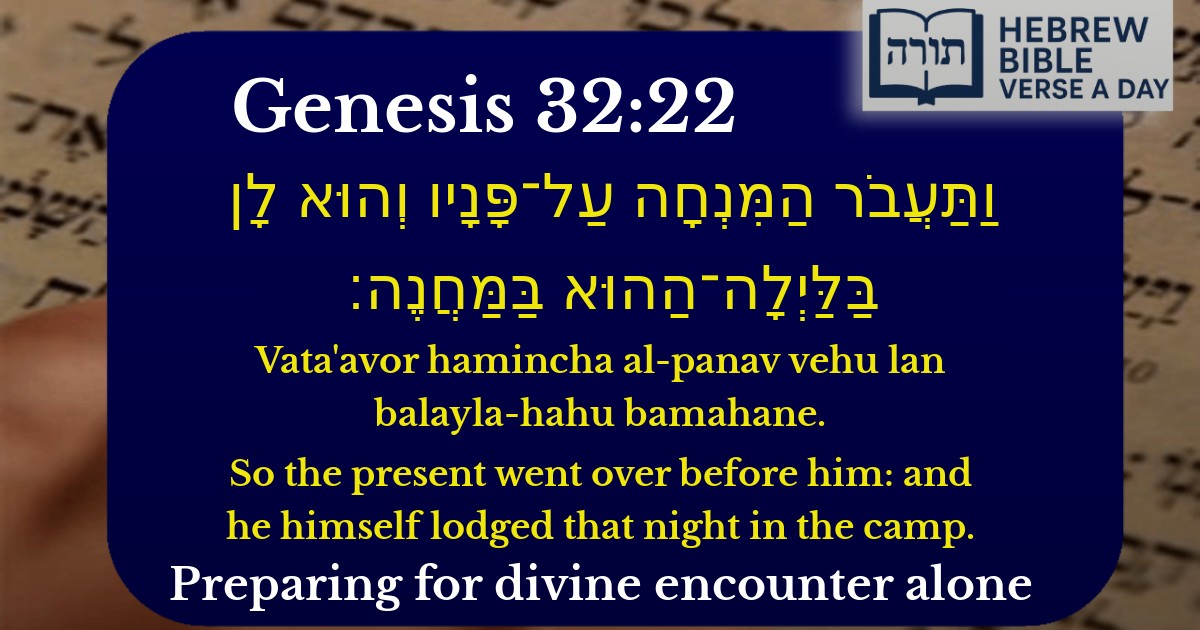Frequently Asked Questions
Q: What does Genesis 32:22 mean when it says 'the present went over before him'?
A: This verse describes how Yaakov (Jacob) sent gifts (called 'minchah') ahead of him to his brother Esav (Esau) as a gesture of peace. According to Rashi, Yaakov strategically sent these gifts in waves to soften Esav's heart before their meeting, showing wisdom in conflict resolution.
Q: Why did Yaakov stay behind in the camp that night (Genesis 32:22)?
A: The Midrash explains that Yaakov stayed behind to retrieve some small jars he had forgotten, teaching us the importance of not wasting even small possessions (Chullin 91a). Ramban adds that this also showed his humility - he didn't rush ahead like an important person, but let the gifts go first.
Q: What lesson can we learn from Yaakov's actions in Genesis 32:22?
A: From this verse we learn two important principles: 1) The value of making peace through thoughtful gestures (as Yaakov did with the gifts), and 2) The importance of being careful with one's possessions (as shown when he went back for the small jars). The Talmud derives from this that righteous people value their money more than their bodies (Chullin 91a).
Q: How does Genesis 32:22 connect to the story of Yaakov wrestling with the angel?
A: This verse sets the stage for the famous wrestling episode that follows. By staying behind alone, Yaakov found himself in a vulnerable position where he could encounter the angel. The Sages explain that this teaches us that moments of solitude can lead to spiritual growth and transformation (Bereshit Rabbah 77:1).
Q: What does the word 'minchah' mean in Genesis 32:22?
A: In this context, 'minchah' refers to the gifts Yaakov sent to Esav. Rashi explains it was a tribute or peace offering, consisting of livestock (as detailed in the following verses). The word can also mean an offering to Hashem, showing that Yaakov approached this reconciliation with spiritual intentions.


Context in Parashat Vayishlach
This verse (Bereishit 32:22) describes Yaakov Avinu's preparations before meeting his brother Esav. After sending gifts (מִנְחָה) ahead to appease Esav, Yaakov remains in the camp overnight. This occurs after his famous struggle with the angel (saritah et Elokim v’et anashim vatuchal).
Rashi's Explanation
Rashi explains that Yaakov remained behind to retrieve small jars (פכים קטנים) that he had forgotten, demonstrating his scrupulous honesty and the value he placed on even seemingly insignificant possessions. This teaches the principle of "tzaar baalei chayim" (avoiding unnecessary suffering of animals) since he crossed back alone rather than making his animals return.
Ibn Ezra's Perspective
Ibn Ezra focuses on the strategic wisdom of Yaakov's actions - sending the gifts ahead while remaining behind in the camp allowed him to assess Esav's reaction from a safe distance before personally engaging.
Midrashic Insights (Bereishit Rabbah)
Halachic Implications (Rambam)
Rambam (Hilchot Gezeila 17:13) derives from this episode the importance of being meticulous with others' property (even one's own animals), as Yaakov risked danger to retrieve forgotten items rather than consider them lost.
Chassidic Interpretation (Sefat Emet)
The Sefat Emet explains that Yaakov's remaining alone represents the Jewish soul's solitary struggle to elevate the physical world. The gifts going ahead symbolize mitzvot preparing the way for divine service, while the personal struggle (represented by staying behind) is necessary for complete spiritual achievement.